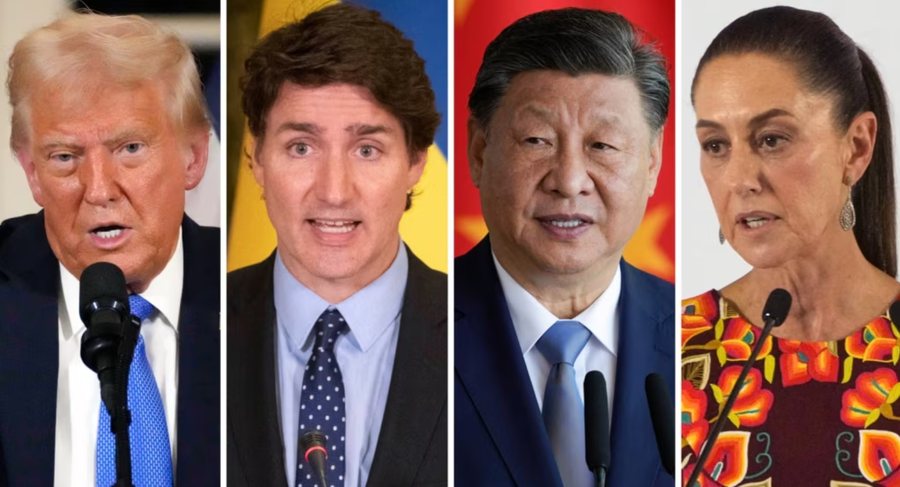
Canada, Mexico and China said Tuesday they would impose retaliatory tariffs on U.S. imports after President Donald Trump imposed new tariffs on goods imported from these countries.
The United States on Tuesday imposed new tariffs of 25% on exports from Mexico and Canada, and doubled a previous 10% tariff on Chinese imports, bringing it to 20%.
President Trump imposed new tariffs on the two neighboring countries, even though Mexico and Canada said they had limited illegal immigrants using their territories to enter the United States and smuggle drugs, as the American leader had requested, reports A2.
Mr. Trump has said the tariffs could cause some temporary economic pain for American consumers and businesses, by slightly increasing the prices of goods imported from these countries. But the American leader has said that in the long run, it will force corporations to move their operations from these three countries to the United States to avoid the tariffs.
President Trump wrote on the "Truth Social" network that, "If companies move to the United States, there are no tariffs."
The United States imposed new 25% tariffs on imports from Mexico and Canada on Tuesday, ignoring evidence that the neighboring countries were curbing illegal migration and the flow of illegal drugs into the United States, as President Donald Trump had demanded.
The US leader first announced the tariffs a month ago and quickly suspended them after Canadian and Mexican leaders pledged to take action. President Trump told reporters on Monday afternoon that he said there was no chance for Mexico or Canada to avoid the tariffs.
Canadian Prime Minister Justin Trudeau said his country "will not let this unjustified decision go unanswered" and announced it would impose 25% tariffs on $155 billion worth of American goods.
Prime Minister Trudeau said Canada has increased personnel and equipment at the border to stop the flow of fentanyl into the United States.
"Because of this work, in partnership with the United States, fentanyl seizures from Canada have dropped 97 percent between December 2024 and January 2025 to a near-zero level of 0.03 pounds seized by U.S. Customs," he said.
Prime Minister Trudeau said President Trump's decision "will ruin a tremendously successful trading relationship" and that the tariffs will cause Americans to pay more for products such as groceries, gasoline and cars.
Mexican President Claudia Sheinbaum, whose trade-dependent economy sends 80% of its exports to the US, suggested her country could also impose retaliatory tariffs.
“It’s a decision that’s up to the government of the United States, the President of the United States,” Ms. Sheinbaum said before Mr. Trump’s comments on Monday. “So whatever his decision is, we’ll make our decisions and there’s a plan. There’s unity in Mexico.”
After President Trump announced new tariffs on Mexico and Canada last month, President Sheinbaum sent 10,000 troops to Mexico's northern border with the U.S. to stem the flow of narcotics.
President Trump and other administration officials said this week that apprehensions of people illegally crossing the U.S.-Mexico border fell to a record low in February.
The fallout from the tariff hike could rattle the economies of all three countries, with perhaps less demand in the U.S. for Mexican and Canadian goods that would increasingly cost American consumers and businesses more.
The United States also imposed a new 10% tariff on Chinese goods on Tuesday, doubling the 10% tariffs imposed by Mr. Trump on Feb. 4. President Trump has blamed China as the source of fentanyl trafficking into the U.S. through Mexico and Canada.
China's Commerce Ministry said in a statement on Tuesday that it firmly opposes the United States' move and will take countermeasures to safeguard its interests. China also said the tariffs violate World Trade Organization rules and harm U.S.-China economic cooperation.
China's finance ministry said that starting March 10, China will impose a 15% tariff on imports of U.S. chicken, wheat, corn and cotton. A 10% tariff will apply to sorghum, soybeans, pork and beef, fruits, vegetables and dairy products, the ministry said in a statement.
Economists say the tariffs President Trump is imposing are likely to raise retail prices for consumers and the cost of materials for businesses. Mexico, Canada and China, in that order, are the United States' three largest trading partners, but the 27-nation European Union is the largest partner.
At the first meeting of his new cabinet on Wednesday, President Trump said he would announce a 25% tariff on goods imported from the EU "very soon."
The EU vowed to respond "firmly and immediately" to "unjustified" trade barriers and suggested it would impose its own tariffs on US imports if President Trump goes ahead with his plans.
In his announcement on the "Truth Social" platform, President Trump said that reciprocal tariffs on those countries that impose tariffs on American goods would take effect on April 2. He has also hinted at imposing tariffs on imports of cars, lumber, pharmaceuticals and other goods.
Many economists have repeatedly warned that tariffs could lead to higher prices, fueling inflation in the U.S. President Trump has acknowledged that such a move could cause short-term pain for Americans, but he has added that tariffs would ultimately be beneficial for the world's largest economy.
President Trump says the tariffs would be an incentive for foreign companies to produce more in the United States as a way to avoid them./ Voice of America (A2 Televizion)











